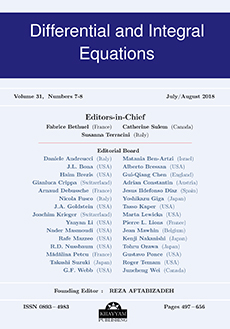Abstract
This paper considers the following sublinear Schrödinger-Maxwell system \begin{equation}\label{man} \begin{cases} -\Delta u+V(x)u+K(x) \phi u =a(x) |u |^{q-1}u, \ \ \ \ \ \mbox{in} \ \ \mathbb{R}^{N},\\ -\Delta \phi = K(x)u^{2}, \ \ \ \ \ \ \ \ \ \ \ \ \ \ \ \ \ \ \ \ \ \ \ \ \ \ \ \ \ \ \ \ \ \ \ \ \ \mbox{in} \ \ \mathbb{R}^{N}, \end{cases} \end{equation} where $N=3, $ $ 0 <q <1,$ and $ a,K,V\in{L^{\infty}} (\mathbb{R}^{3} )$. We suppose that $K$ is a positive function and $a, V$ both change sign in $\mathbb{R}^{3}$. There seems to be no results on the existence of infinitely many solutions to problem (0.1). The proof is based on the Symmetric Mountain Pass theorem.
Citation
Anouar Bahrouni. Hichem Ounaies. "Infinitely many solutions for a class of sublinear Schrödinger-Maxwell equations in $\mathbb{R}^{N}$ with indefinite weight functions." Differential Integral Equations 27 (1/2) 45 - 57, January/February 2014. https://doi.org/10.57262/die/1384282853
Information





